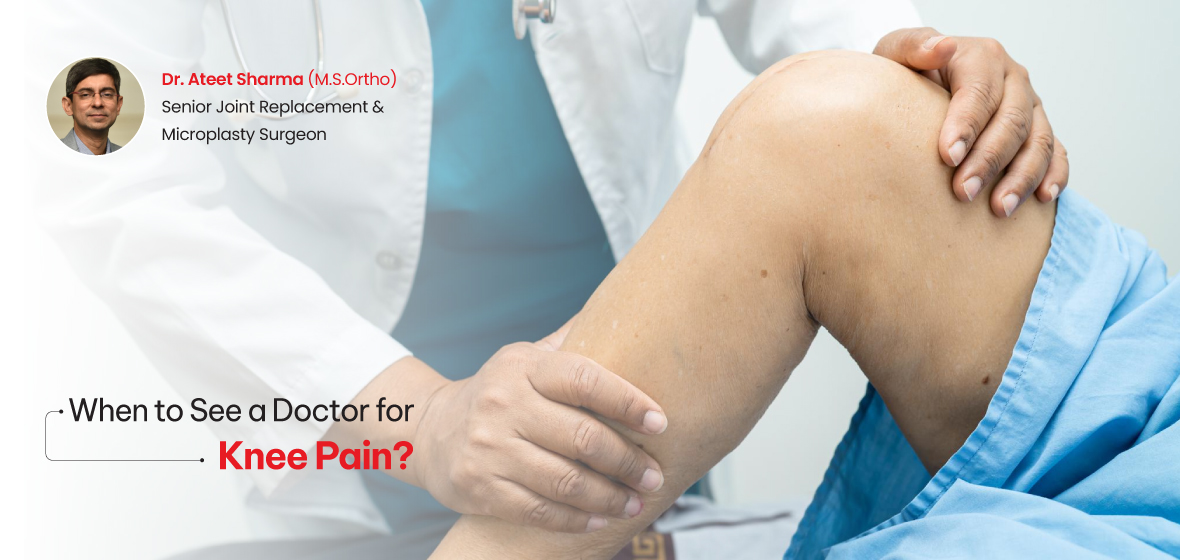
Most of us have experienced knee discomfort at some point in our lives, whether it was caused by a quick twist while playing sports or a dull aching that developed after a long day.
But how can one determine whether pain is an indication of anything more serious or only a passing symptom? Imagine going about your morning routine, climbing stairs, running errands, or simply going for a walk, and your knee suddenly starts hurting.

You deny accepting it at first, thinking that it might be because you overdid it yesterday. However, the pain stays or increases. You start wondering if this is normal. Should I be concerned? To get a proper answer, visit Dr Ateet Sharma, who is one of the best doctors for Knee replacement surgery in Ahmedabad. Get advice from one of the top ones he will make you understand your problem from scratch.
In this blog, we'll go over a few scenarios in which knee pain could express a serious problem, the warning signs you should never ignore, and when it's time to see a doctor for knee pain. Whether you're surviving acute knee pain after an injury or a chronic issue that's gradually worsening, this blog will help you make informed decisions regarding your knee health. Before we move to When to See a Doctor for Knee Pain.
Begin with self-care! If there are no symptoms of injuries in your knee, you can resume your routine activities. Your knee pain can develop gradually over time. Perhaps you moved differently, adapted to new habits, or had a minor injury. In some cases, self-care at home might relieve knee problems.
Commonly, Arthritis is a reason for chronic knee pain. Arthritis can be caused by ageing, previous damage, or excessive use. It can also occur when the knee joint is unstable or carries a high-level weight. Low-impact exercise and weight loss may assist in treating painful knee arthritis. You can do Exercise to strengthen the joints. Weight loss, if necessary, relieves pressure. To deal with your knee discomfort at home:
Rest Your Knee Joint : Avoid standing as much as possible. Use a cane, walker, or other mobile support until your knee heals.
Switch to Low-impact Activity : Stay active, but choose movements that are gentle on your knee joints. You could swim instead of jogging or cycle instead of playing tennis.
Ice Method : This is the second method from the rice method (rest, ice, compression and elevation) commonly used to relax knee pain. Wrap ice on a piece of cloth and apply it to the swelling portion of your knee for around 15 minutes or more.
Some kenne pains can be managed or cured at home. But, some symptoms give you signs of immediate medical need. Here, we are listing some of the signs that you should not ignore and seek a knee specialist. See a doctor if your knee discomfort has progressed where you limp or avoid walking. Pain of this intensity may indicate a bone fracture or a degenerative disease.
Do you find yourself avoiding raising yourself or lifting big objects? If lifting something heavy or climbing stairs causes your knee to give out on you, you need help during these activities. This symptom could signal several knee problems that require medical care.
Consider your knees with one another. If your damaged knee appears bent as compared to your healthy knee, you could have a fracture, dislocated kneecap, or patellar injury.
If your knee shakes or feels like it's about to collapse, seek medical attention. In general, joint instability signals a ligament problem, which can worsen if you continue to use your knee as usual.
If your symptoms start to interfere with your daily life, it is advised by the knee specialists. You should make an appointment as soon as possible. If knee pain makes your commute difficult, your afternoon jog uncomfortable, or your job tougher, have a professional evaluate the joint.
Don't try to endure knee discomfort. If you are facing any reduction in your motion due to some knee injuries, it lasts for more than a day or two. And you are not able to move or bend your knees or see any swelling in them. If you suffer any of the symptoms described above, seek medical attention. If your symptoms appear slight or occasional, consult your general practitioner. They will advise you on whether or not to see a specialist.
If you observe a rapid change in your symptoms or if your symptoms are severe, arrange an evaluation with a knee specialist, especially if you are an athlete.
Points that we have discussed in this blog include a brief on knee problems and their symptoms and when to see a doctor for knee pain. If you are facing some other problems that indicate knee issues, visit Dr Ateet Sharma, a well-known doctor for knee replacement in Ahmedabad. He will assist you with what to do to cure your problem. Ending up here with the hope that you will care for your knee health, and if you are not able to do it, get the help of a Knee specialist. Stay healthy and enjoy your daily routine.
© 2025 Dr.Ateet Sharma All rights reserved. | Manage by Nexus